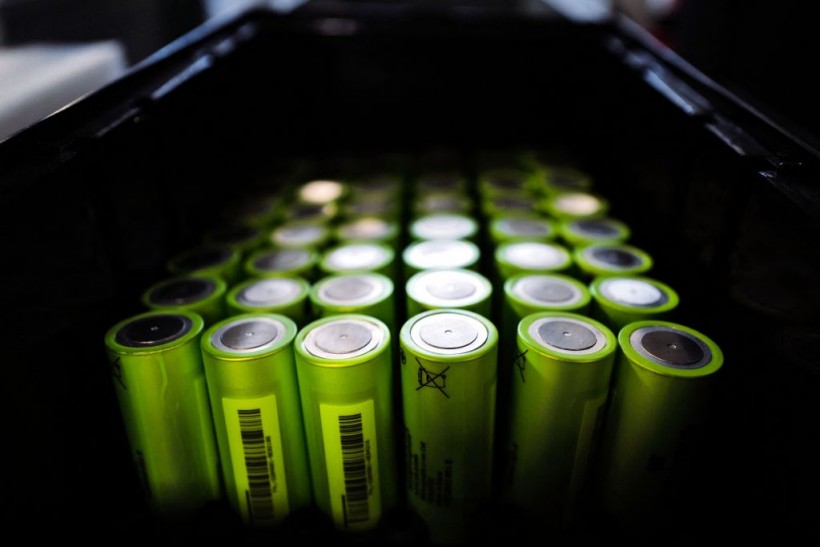Establishing a sustainable lithium supply chain for electric vehicle batteries and grid storage worldwide requires environmentally-friendly lithium extraction methods. Volcano sedimentary lithium resources, typically shallow and high-tonnage deposits with minimal waste, hold promise in meeting these criteria.
Recently, a breakthrough discovery suggests that the United States (US) may have serendipitously discovered the world's largest deposit of this nature, potentially revolutionizing lithium sourcing for clean energy technologies.

A photo shows lithium batteries for aeronautics manufactured by the company Limatech, in Voreppe near Grenoble on June 12, 2023.
World's Largest Lithium Deposit Found in the US
In the study, titled "Hydrothermal Enrichment of Lithium in Intracaldera Illite-Bearing Claystones" published in Science Advances, researchers estimate that the volcanic crater on the Nevada-Oregon border called McDermitt Caldera harbors 20 to 40 mllion metric tons of lithium.
Based on these latest estimates, the McDermitt Caldera contains a staggering amount of lithium, surpassing even the lithium reserves found in Bolivia's renowned salt flats, which house approximately 23 million tons.
Geologist Anouk Borst from KU Leuven University, who was not involved in the study, remarked that if these initial calculations hold, this discovery could have a profound impact on the global lithium landscape, affecting factors such as pricing, supply security, and geopolitics.
Unlike many lithium-rich sources, which are often found in brine, the McDermitt Caldera's lithium reservoir, especially in the southern Thacker Pass region in Nevada, is found within clay deposits. The caldera originated from a massive volcanic eruption approximately 16.4 million years ago, bringing up substantial amounts of lithium and other metals.
Over time, a lake formed within the caldera, depositing layers of sediment containing lithium, now over 600 feet deep, resulting in a type of clay known as smectite.
However, this initial lithium infusion was not the end of the story. Subsequent volcanic activity brought hot lithium-containing brine into the existing smectite, enriching it further. Consequently, the clay transformed into a distinctive and lithium-rich illite.
Borst said that the unique aspect of this discovery lies in the preservation of these lithium-rich clays near the surface, minimizing the need for extensive rock extraction while preventing significant weathering.
READ ALSO: Researchers Develop Ultrahigh Capacity Lithium Oxygen Batteries
A Good News for Miners
Lithium Americas Corporation's geologist, Thomas Benson, anticipates commencing mining operations in 2026 at the southern part of the crater known as the Thacker Pass. The extraction process involves removing clay using water and then separating the lithium-bearing grains from larger minerals through centrifugation.
Subsequently, the clay undergoes leaching in sulfuric acid vats to extract the lithium. If this extraction method proves to be low-energy and acid-efficient, it could have significant economic implications, providing the US with its lithium supply and alleviating concerns about shortages in various industries.
Benson considers the Thacker Pass lithium-rich claystone deposit to be unique among volcanic sedimentary sources and suggests that future exploration should focus on calderas with hydrothermally altered lake sediments without outflows for additional lithium deposits.
The discovery of lithium-rich illite clay at Thacker Pass is good news for miners due to its higher lithium content and easier separability. Moreover, the deposits are concentrated in a limited area at the southern end of the pass, minimizing the mining impact.
However, the environmental concerns surrounding lithium extraction, including significant carbon dioxide emissions, groundwater contamination with heavy metals, and high fossil fuel consumption, should not be disregarded in the pursuit of green transportation infrastructure.
Despite these concerns, the Thacker Pass mining project has faced controversy, with conservationists and Native American activists opposing it on environmental and cultural grounds. Their appeals were recently rejected by a federal court in July, allowing mining activities to commence at the site.
RELATED ARTICLE: Vast Reserves of Lithium Found in Chile's Atacama Desert; Will Mining It Affect Environment?
Check out more news and information on Battery in Science Times.














